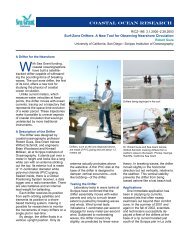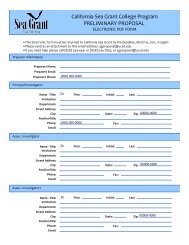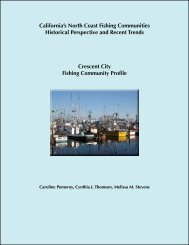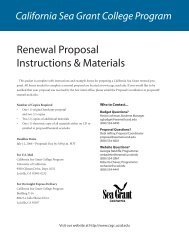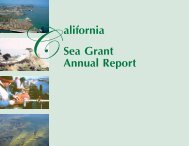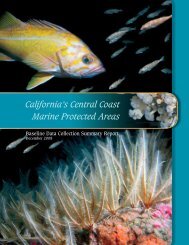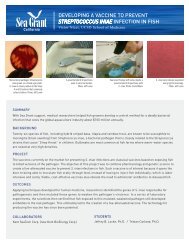PAT-UC Covers - California Sea Grant - UC San Diego
PAT-UC Covers - California Sea Grant - UC San Diego
PAT-UC Covers - California Sea Grant - UC San Diego
You also want an ePaper? Increase the reach of your titles
YUMPU automatically turns print PDFs into web optimized ePapers that Google loves.
Education<br />
Educating the Next Generation<br />
In addition to supporting graduate students in the marine<br />
sciences, <strong>Sea</strong> <strong>Grant</strong> funds a small number of projects that offer<br />
exceptional – and cost effective – opportunities for furthering<br />
the education of our nation’s youth. CSG funds these special<br />
projects in the hopes of teaching students how to think<br />
analytically and through the lens of the scientific method. The<br />
need for these types of enrichment programs is clear. In the last<br />
two decades, despite rhetoric about education’s importance,<br />
Scholastic Aptitude Test scores have continued to decline – a<br />
distressing trend for a nation whose economic prosperity hinges<br />
on our scientific and technological eminence. The marine<br />
sciences provide an ideal gateway for teaching basic science<br />
principles – and for encouraging stewardship of our natural<br />
heritage.<br />
Funding and support for the camp exemplifies the power of<br />
community participation. Collaborating organizations include<br />
the outdoor store Adventures-by-the-<strong>Sea</strong>, the <strong>California</strong><br />
Coastal Commission, Monterey Bay Aquarium, the <strong>California</strong><br />
State University system, the University of <strong>California</strong>, Stanford<br />
University, and NOAA’s Elkhorn Slough National Estuarine<br />
Research Reserve.<br />
Brief synopses follow for some of the educational partnerships<br />
<strong>Sea</strong> <strong>Grant</strong> has joined in the last five years.<br />
Camp <strong>Sea</strong> Lab Monterey Bay, 2002. (Photo J. De Lay)<br />
Summer Science Camp for Underrepresented Urban<br />
Youth<br />
In order to provide educational opportunities for children from<br />
economically disadvantaged backgrounds, <strong>Sea</strong> <strong>Grant</strong> supported<br />
the creation of a marine science youth camp, open to all but<br />
specifically aimed at inner-city youth from Los Angeles. The<br />
camp, originally run by <strong>UC</strong>LA, is today self-sustaining and<br />
is managed by Heal the Bay and the City of <strong>San</strong>ta Monica, in<br />
collaboration with Los Angeles Boys’ and Girls’ Clubs.<br />
Camp <strong>Sea</strong> Lab Monterey Bay, 2003. (Photo J. De Lay)<br />
Camp SEA Lab<br />
In 2002, Camp SEA Lab Monterey Bay opened its doors for<br />
the first time. SEA Lab – short for Science, Education and<br />
Adventure Lab – has been a labor of love for CSG marine<br />
advisor Rick Starr, chair and president of the camp’s board of<br />
directors for the last four years.<br />
In its first year, more than 100 children ages eight to thirteen<br />
kayaked through kelp forest canopies, hiked along beach<br />
dunes and boated in search of sea otters. Complementing<br />
these outdoor activities, children participated in educational<br />
programs based on National Science Education Standards. In<br />
addition to working with students, the camp operates ocean<br />
science training programs for teachers.<br />
In 2001, about 600 children, ages five to seventeen, attended <strong>Sea</strong><br />
Camp and participated in a variety of field and lab experiments<br />
in <strong>San</strong>ta Monica Bay. Perhaps, the greatest value of the camp,<br />
however, has been in exposing these children, many of whom<br />
had never been to the beach, to the wonders and magic of the<br />
sea (see project R/E-71PD).<br />
Young Marine Scientists and Teachers as Scientists<br />
<strong>California</strong>’s large and growing Hispanic population is highly<br />
underrepresented in the sciences. One reason may be the<br />
quality of science education in public schools in underserved<br />
communities. To encourage scientific literacy, <strong>Sea</strong> <strong>Grant</strong><br />
supported researchers at <strong>UC</strong> <strong>San</strong>ta Barbara to work with K-12<br />
students from the <strong>San</strong>ta Barbara County School District on a<br />
variety of experiments and classroom science activities. Besides<br />
developing science skills, interpersonal interactions were geared<br />
25<br />
<strong>California</strong> <strong>Sea</strong> <strong>Grant</strong>: 1998-2003



